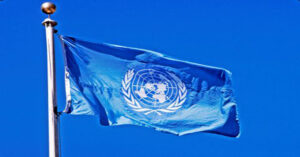 The United Nations Human Rights Council holds three regular sessions a year: a total of ten weeks. The most recent took place from June 6 – 23. In this assembly, which was held in Geneva, various countries including the United States, United Kingdom and Germany, raised their concern over the deteriorating human rights situation in China, especially in Tibet and Xinjang (the province formerly known as East Turkestan in northwestern China).
The United Nations Human Rights Council holds three regular sessions a year: a total of ten weeks. The most recent took place from June 6 – 23. In this assembly, which was held in Geneva, various countries including the United States, United Kingdom and Germany, raised their concern over the deteriorating human rights situation in China, especially in Tibet and Xinjang (the province formerly known as East Turkestan in northwestern China).
In a special meeting, Human Rights Situation: Seeking Solution (Case of Palestine and Tibet), delegates from the United States expressed concern over the treatment of lawyers and activists who have been detained, tortured and forced to confess to political charges on state media. The German delegation urged China to release all detained human rights defenders and to allow the High Commissioner and Rapporteurs to visit Tibet. Various other human rights organisations, among them the Helsinki Foundation for Human Rights (HFHR), urged “the Council to call on China to grant independent and impartial monitors unfettered access to Tibet, as agreed to by China following its 2013 Universal Periodic Review”.
During the session, KalsangGyaltsen, a former representative for the office of His Holiness the Dalai Lama in Europe, spoke of the Middle Way Approach, explaining that it is a viable solution to solve the issue with China. The approach demands autonomy for Tibetan people within the framework of the constitution of the People’s Republic of China and is not a call for independence. China refuses to accept either the Middle Way Approach or a dialogue with His Holiness the Dalai Lama’s representatives or the Tibetan Government-in-Exile.
Ultimately, Greece, a significant recipient of Chinese investment, blocked an EU statement to criticise China’s human rights record. This is the first time in a decade that the European Union is divided on human rights opinions and fails to raise a collective voice in a UN Human Rights Council meeting. It appears that the EU continues to be divided along economic interests.
During the session, hundreds of Tibetans and Tibet supporters gathered in front of the UN office in Geneva, calling for the end of human rights violations in Tibet.




 Print
Print Email
Email